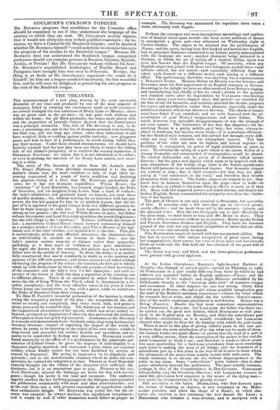Perhaps the strongest and most incongruous assemblage and applica- tion
of musical talent upon record—the most entire unfitness of means to accomplish a given end—was witnessed on Wednesday night at Covent Garden. The object to be attained was the performance of Norma; and the opera, having been first hacked and hewed into English, had its principal character committed to an Italian, utterly unacquainted with the language she used ; another character being intrusted to a German, to whom the art of setting off a modern Italian opera was even less 'known than the English tongue. Of necessity, when any English singer was joined with those two foreigners, we had three vocal schools—mixed, but not united—each essentially different from the other, each formed on a different model, each aiming at a different effect. The performance, therefore, was anything but a representation HELLINI.S Norma. Madame RONZI DE BEGNIS was the heroine, and STAUDIGL made his first appearance in an English company as Oroveso. Reverting to the delight we have so often received from RONZI'S singing, and remembering that chiefly to her we owed a return to the genuine and classical opera after its degradation by CATALANI—recollecting also how many years have elapsed since that period—we trembled for the fate of our old favourite, and certainly attended the theatre prepared for regret and mortification rather than pleasure, especially ander the additional obstacle which was thrown in her way. The charm of beauty must have faded if not vanished ; and we were haunted with the re- membrance of poor MAna's reappearance and utter failure. The result, however, was agreeable disappointment—it was the triumph of art over nature. The fascination of her face has departed—the be- witching Rottzt is a portly middle-aged lady ; her voice, always in- clined to reediness, has become more reedy—it is sometimes offensive : but her finished style remains, and this carried her through every diffi- culty, not only with tolerable but triumphant success. The best portions of her voice are now its highest and lowest register : its flexibility is unimpaired, its power of rapid articulation as great as ever. To criticize the acting of a part which is the coarse fiction of a clumsy dramatist, and compounded of incongruities, would be absurd. No natural delineation can be given of a character which nature disowns ; but the grace and dignity which seem to be inspired with the very atmosphere of the Italian stage (that is the Italian operahouse) Roszt still posseses in an undiminished degree. Our dramatic singers are content to sing ; that is their vocation—for that they are paid : acting is " not nominated in the bond," and therefore they trouble themselves little about it. The Italian singers are trained to act : they know how to demean themselves upon the stage—how to walk—to look—to feel, or (which is the same thing in effect) to seem as if they felt. Even with her impaired powers and faded charms, and despite her broken English, RoNzx commanded the sympathy as well as the admira- tion of her hearers.
The part of Oroveso is not only unsuited to STAITDIGL, but unworthy of bins. It contains only a few bars that can be rendered promi- nently effective ; and he made those tell by his energetic delivery and his splendid voice. How the two foreigners are to pull effectively in the same team, we must leave to time and Mr. BUNN to show. They will be unable to converse without an interpreter : RONZI speaks Italian and French, STAUDIGL German and English. They have no common ground of any sort, nor any musical sympathies or tastes that are akin. They are two—but certainly no match.
Miss RAINFORTH acquitted herself with her accustomed ability. She has had to contend with various competitors of great name during her comparatively short career, but none of them have cast her into the shade or weakened the firm hold she has obtained of the good-will of her auditors.
The house was very well filled, and the three principal performers were greeted with general applause.


























 Previous page
Previous page